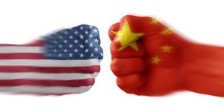|
Clash of the Titans - China vs America - heats up in the South China Sea
by Tony Burman via gail - Toronto Star Saturday, Jun 6 2015, 9:10am
international /
prose /
post
When the history of this century is finally written, its leading headline will likely be the emergence of China as the world’s dominant superpower. China has already overtaken the United States as the world’s largest economy.

What is unknown, of course, is how it will happen, and how the United States will respond, as this epic transformation gradually takes shape.
This makes the rising tensions in Asia’s South China Sea so revealing. It may be a first glimpse into how this colossal 21st-century rivalry will unfold.
Over the past 18 months, China has been dredging sand from the bottom of the South China Sea and building artificial islands in waters claimed by several Asian nations. Others have built similar islands to reinforce territorial claims, but none to the extent of China.
In its defence, China has stubbornly asserted that this is within its rights to “safeguard our own sovereignty.” But the United States, prodded by its rattled Asian allies, said it would not be intimidated. Ashton Carter, the U.S. secretary of defence, warned against the “militarization” of the area and said America would continue to exercise its “freedom of navigation” in international waters. He called for an “immediate and lasting halt” to all land-reclamation projects in the South China Sea.
Although the potential for danger remains, what is reassuring about this dispute so far is that both governments appear to want to cool the rhetoric. Their actions have been measured and restrained.
They seem to realize that the last thing the world needs now is a deepening rift between China and the United States. Instead, these two rivals need to find a way to manage their competing interests in the years and decades ahead.
But that will not be easy. The possibility that an incident could escalate into a dangerous conflict is real.
The U.S. military has yet to test China’s territorial claims around the artificial islands, but that is certain to happen. Last month, a U.S. television crew aboard an American surveillance plane captured a tense radio exchange between the U.S. aircraft and Chinese forces.
According to the CNN video, a voice can be heard telling the Americans: “This is the Chinese navy ... This is the Chinese navy … Please go away … to avoid misunderstanding.”
But however restrained the Chinese and American governments are with each other, they both have to deal with powerful hardliners at home. And in the United States, these voices have been loud.
Conservative and Republican commentators — unrelenting proponents of the “be afraid, be very afraid” approach to foreign policy — have seized on this dispute as further “retreat” by the Obama administration.
China’s growing influence is also cited as a reason for increasing America’s military forces, even though the U.S. is far ahead of everyone in military spending. What seems to infuriate these critics is the notion that China wants primacy in its own backyard, just as the United States has exercised its primacy in much of the rest of the world.
The conservative Wall Street Journal, which sees rising “dangers in a world where authoritarians grow in power,” added this in a May 25 editorial: “Perhaps the greatest long-term regional threat (to the United States) is a rising China with its rapid economic growth and desire to restore the Middle Kingdom to what its leaders see as their rightful dominance in East Asia.”
Some analysts argue there are parallels between the imperial ambitions of China today and those of Kaiser’s Germany a century ago on the eve of the First World War.
But I share the view of U.S. foreign affairs analyst Robert D. Kaplan, who compares present-day China with the United States in the early 20th century when it effectively ejected Europe from the Caribbean and went on to dominate the hemisphere.
In his book Asia’s Cauldron: The South China Sea and the End of a Stable Pacific, Kaplan writes that the Chinese are seeking to reduce American influence in Asia with the strategic aim to “exercise de facto hegemony over their own Asian Mediterranean.”
If one looks at America’s actions in the past century, should we expect anything different from China?
© 2015 Toronto Star Newspapers Ltd.
http://tinyurl.com/odwsut2
<< back to stories
|